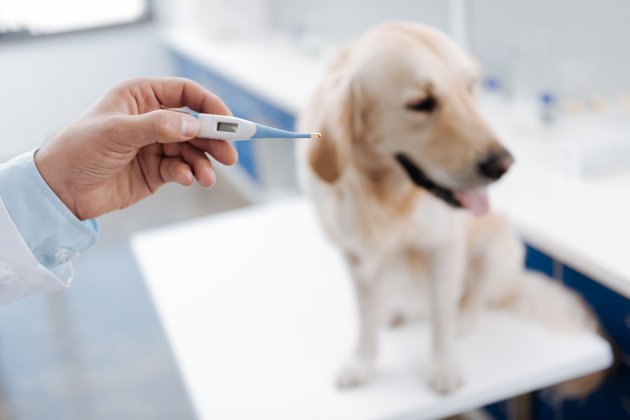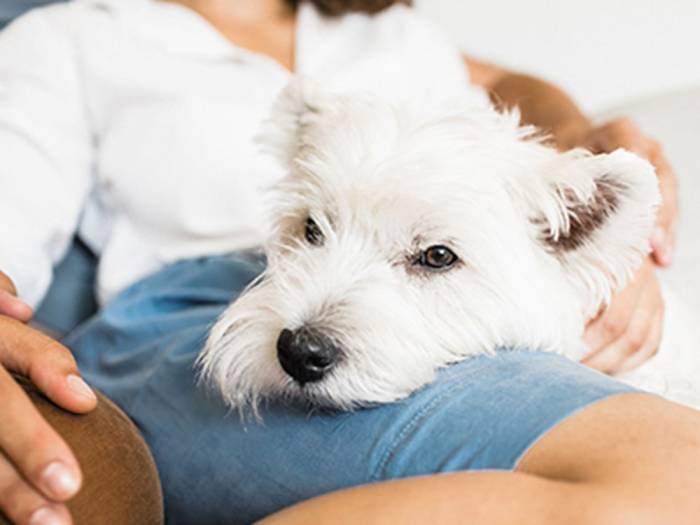Our dogs can develop the same medical issues that we develop, including issues with the thyroid gland. Thyroid issues in dogs are about as common as they are in us. In fact, one of the most common thyroid issues in dogs is called hypothyroidism. We understand you have many questions about this medical condition. Before moving on to thyroid problems and their signs & symptoms, we’ll first take a look at what the thyroid is and what it does.
Connect with a verified veterinarian in minutes. Licensed vets are available 24/7 to answer your questions. No need to worry about your furry family member.
The Thyroid Gland—What is It & What Does It Do?
The thyroid gland is found in your canine companion’s neck, where it makes and secretes a hormone called thyroxine (T4). It also makes other important hormones to help regular bodily functions. Thyroxine & other hormones regulate your pup’s metabolism; when the thyroid hormones are out of balance, your fur baby won’t feel well.
This medical condition can be found in all dog breeds, though it’s most common in:
- Dobermans
- Irish Setters
- Golden Retrievers
- Dachshunds
- Boxers
- Cocker Spaniels
Thyroid problems usually hit when a dog’s in middle age (about 4-10 years old), and most often to medium and large breed dogs. Female dogs that have been spayed and neutered males have a slightly higher risk for developing this health issue.
Types of Thyroid Issues in Dogs
There are two main types of thyroid problems in dogs. These include hypothyroidism and hyperthyroidism.
Hypothyroidism: happens when the thyroid doesn’t produce enough thyroid hormones. It can be caused by an autoimmune disease, where your pup’s own immune system attacks health tissues. Hypothyroidism can also be caused by a tumor on the thyroid. Other causes include a shrinking thyroid, and/or a tumor on the thyroid. This is the most common cause of thyroid problems in dogs.
Symptoms of hypothyroidism may include:
- Obesity
- Lethargy
- Exercise intolerance
- Mental dullness
- Weight gain (with no change in appetite)
- Intolerance to cold
- Changes in skin and coat (increased shedding, hair thinning, hair loss)
- Thickening skin
- Dog hypothyroidism anxiety
- Reproductive issues in intact dogs (infertility, lack of heat periods, miscarriage of pups)
- Seizures
- Slowed heart rate
- Toenail/ear infections
- Heart & blood vessel issues
- Thickening of facial skin
- Increased dark pigmentation of the skin
- High blood cholesterol
- Hair fails to regrow after clipping or shaving
Hyperthyroidism: this is caused by an overactive thyroid in dogs; in other words, the thyroid is too much thyroid hormone. This is a relatively rare condition in dogs and is generally caused by a thyroid tumor. These are usually very aggressive. Other causes include thyroid medication—if your fur baby has been diagnosed with hypothyroidism in the past, and prescribed thyroxine, if he’s taking too much of this medication, he could develop hyperthyroidism.
Raw food diets can also cause this condition, especially if a dog is eating a lot of gullets, head meat, animal necks, etc. which contain higher amounts of thyroid hormones
Symptoms of hyperthyroidism in dogs generally include:
- Excitability (more than normal)
- Depression
- Diarrhea
- Weakness
- Increased appetite
- Frequent need to urinate
- Excessive thirst
- Excessive weight loss
- Personality & mood changes
- Vomiting
- Enlarged thyroid (will feel a lump in your fur baby’s neck)
- Irregular heartbeat

Review symptoms, medications & behavior to keep your pets healthy with a Vet Online in just minutes.
Ask a Vet Live NowDiagnosis of Thyroid Problems in Dogs
Thyroid problems in dogs needs to be diagnosed by the vet. The most common test is a blood test that measures the total thyroxin (TT4) levels. Other blood tests may include the free T4 by equilibrium dialysis or a thyroid panel, which measures the levels of multiple forms of thyroxin. The vet may also order a complete blood count, and a urinalysis. Once they have the test results, the vet will be able to diagnosis the thyroid issue your fur baby’s having. However, they may still require an endocrine test, and possibly radiographic studies that may show what’s causing the thyroid problems (such as tumors, etc.).
Thyroid Support for Dogs
Treatment will depend on the type of thyroid issue your vet has diagnosed. For instance, if your fur baby has hypothyroidism, his treatment will include synthetic thyroid hormone replacement medication, restrictions to his diet, etc. It’s likely your pup will be on the thyroxine (synthetic thyroid hormone medication) for life. However, with treatment, your dog will be able to have a normal life span and go back to enjoying those things he loves to do. Every few months, you may need to take your dog back to the vet for a blood test. The test will determine whether or not the medication dosage needs to be adjusted.
Treatment of hyperthyroidism depends on what has caused the condition in your fur baby. If a medication has caused this problem, the vet will adjust the medication until it’s at the right level for your dog. Once this is done, your pup should begin to feel better and his symptoms resolve. If this medical condition is caused by your dog’s diet, then the vet will recommend dietary changes. This issue usually resolves over time, and your pup will feel better again in no time. Sometimes hyperthyroidism is caused by an aggressive form of cancer, which can often be deadly. If your dog has this form of thyroid problem, treatment will depend on the size of the tumor and whether or not it has spread (metastasized).
Your dog may require surgery for thyroid cancer which involves removal of the tumor, or possibly the entire thyroid gland. In addition, the vet may order radiation therapy and chemotherapy to fight the cancer. The key to this kind of cancer is to catch it as early as possible. Early diagnosis and treatment may find the cancer before it’s spread. Hyperthyroidism in dogs untreated can lead to death. So, if you suspect your fur baby has a thyroid problem, then it’s important to get him to the vet as soon as possible. For dogs that survive thyroid cancer, a strict diet is followed in order to keep the kidneys healthy.
Best Dog Food for Hyperthyroidism
If your dog has been diagnosed with hyperthyroidism, you’ll need to make changes to his diet. Make sure to follow your vet’s recommendations. The vet may recommend some breed-specific formulas. You’ll also need to find dog food that’s grain free. This means the dog food should not contain:
- Soy
- Wheat
- Corn
- GMO (Genetically Modified Organisms)
These ingredients are often used as fillers and have no nutritional value for dogs. In fact, these ingredients can cause other health issues, too, such as allergies, digestive issues, and more. Your vet may also suggest making your dog’s food at home by cooking it yourself. They will give you advice on what types of ingredients to include, those to stay away from, etc. In fact, the vet may be able to recommend ingredients and recipes that will appeal to your dog, while ensuring he gets the right number of calories and the nutrition he needs from vitamins and other nutrients. When making a change to your dog’s diet, the vet may also recommend making the changes slowly. A sudden change to your pup’s food can cause digestive and potty issues such as bloating, belching, gassiness, vomiting, diarrhea, etc.
It’s often best to include a portion of your dog’s regular food with a small amount of the new dog food in the beginning. Over time, you’ll need to decrease your dog’s current food, while increasing the amount of his new food. Most dogs deal very well with this method of changing over to the new diet. However, be sure to follow your vet’s instructions on how to do this for your dog. In addition, here are some dog food formulas that have been recommended for hyperthyroidism.
Taste of the Wild Pacific Stream Dog Food
This dog food provides your fur baby with a balanced diet and is a grain-free dry dog food. It contains protein from real smoked salmon and includes peas and sweet potatoes to give your dog the energy he needs. Other ingredients include real fruits, vegetables, along with dried chicory root. This food is also great for dogs that have food allergies and sensitivities. The product is made in the USA by a family owned and run company, with the most scientifically advanced food safety protocols.
Blue Buffalo Life Protection Formula
This dry dog food comes in various flavors including chicken & brown rice, fish & brown rice, lamb & brown rice. It’s made with real meat, and you’ll find this listed first on the ingredient list. This dog food is made for adults and contains essential proteins and carbohydrates to help meet your dog’s energy needs. It also features omega 3 & 6 fatty acids to make your dog’s fur and skin healthy. Each formula contains Blue’s exclusive LifeSource Bits, which are a precise blend of antioxidants, vitamins and minerals to support your dog’s immune system, and it meets life stage requirements.
This dog food contains no chicken or poultry by product meals, corn, wheat, soy, artificial flavors or preservatives
Purina Pro Plan Savor Adult Shredded Blend Chicken & Rice
This dog food is made with high-quality protein, including real chicken as the first ingredient on the label. It’s fortified with guaranteed live probiotics to support your dog’s digestive and immune health. This crunch kibble and tender, meaty pieces are sure to please your dog’s palette!
Summing It Up
As you can see, thyroid problems in dogs can really make your pup feel badly. If your fur baby seems to be showing any of the signs and symptoms of thyroid trouble, then it’s a good idea to get him in to see the vet for a checkup.
If caught early, thyroid issues are more easily treated. In the case of hyperthyroidism caused by cancer, the soon your dog receives treatment, the better. We wish you and your fur baby all the best!
Connect with a verified veterinarian in minutes. Licensed vets are available 24/7 to answer your questions. No need to worry about your furry family member.

Kyoko
Kyoko is from a family of 3 and moved to New York with her parents and siblings when she was 13. Kyoko is fond of spending a great amount of time with pets, specifically her beagle Luna and cat Missy. Her boyfriend often complains that she spends too much time giving attention to their animals. Kyoko has written dozens of articles concerning pets and is aiming at owning a pet shop one day!
Review symptoms, medications & behavior to keep your pets healthy with a Vet Online in just minutes.
Ask a Vet Live Now



